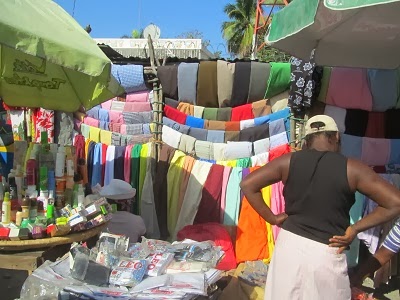Crisis is often linked to reductions in circulation of one sort or another. Economic crisis, such as the GFC, involves the slowing down of circulation of monetary value. Political crises, such as the recent shutdown of the US congress, see procedures of governance and statehood come to a halt. And human crises often prompt changes in circulation, such as displacement due to a natural disaster, or long stays in refugee camps.
 |
| A street market in Port-au-Prince. Photo taken by Erin Taylor. |
In times of crisis, then, things that compel circulation are especially useful. Bailouts, negotiations, passports, and buses are all mobilizing agents that can help get things moving along desirable paths.
Mobile phones and cash are two particularly powerful mobilizing agents. Not only do they move themselves, they help other things overcome crucial barriers to circulation. Mobile phones permit instant communication and coordination of the movement of people, commodities, and cash. Cash simplifies the process of transferring ownership of goods by making everything quantifiable and fungible. Both the mobile phone and cash store and transfer value, increasing control and mitigating risk for the people who hold them.
 |
| Money changer. Photo by Erin Taylor. |
Mobilizing money after the earthquake
On January 12, 2010, a 7.0 magnitude earthquake devastated Port-au-Prince and nearby areas in Haiti. With rubble covering the streets, people couldn’t easily move to find their friends and families. Emergency services struggled to reach survivors and deliver aid. Banks weren’t operational and people couldn’t withdraw or transfer cash. The main road out of town to Jacmel in the south was blocked for ten days.
Landlines ceased to be operational for months after the earthquake. Both mobile network operators, Digicel and Comcel, lost most of their capacity for a day or two, but were restored quickly relative to other infrastructures and services.
With continuing blockages to circulation, communications became particularly important. Once capacity was re-established, mobile phones took on central role in coordinate recovery and relief efforts. USAID and the Gates Foundation took this opportunity to incentivize the development of mobile money by offering $10 million in prize money to service providers who launched mobile money services within a certain time frame. By the end of 2010, there were two mobile money services in Haiti: Digicel’s TchoTcho Mobil, and Voilá’s T-Cash.
Mobile money services were used in relief and recovery efforts by Mercy Corps to deliver food aid in Port-au-Prince, Mirebalais, and Saint Marc. Given that recipients generally did not have bank accounts, using mobile money streamlined the process of delivering regular payments to the workers and displaced families registered in their programs, saving time and effort for both donors and recipients.
Everyday crises and circulation
While all economies depend upon circulation, one could argue that it is all the more crucial in developing economies where people earn uneven incomes and good may be scarce. People in wealthier countries tend to have greater stores of resources on hand, such as food in their pantry and cash in their wallets. In Haiti, the poorest country in the western hemisphere, people tend to store little of value, meaning that without circulation, a family may not eat.
 |
| A woman selling in the Marche en Fer, Port-au-Prince. Photo by Erin Taylor. |
It would be misleading, however, to assume that keeping minimal stores of value is always an act of desperation. Anthropologist Timothy Schwartz (2009) observes that it is also a strategy to maximize profits. He writes how Haitians turn cash (including agricultural profits) over in the market rather than storing it at home:
Female market activity is so important to household livelihood that few people would dare save money by stashing it away. A person who has money will invariably “put the money to work” by giving it to a female relative or friend who will roll the money over in the market, for as they say in Jean Rabel, lajan sere pa fe pitit (stashed money bears no children).
This focus on liquidity is not just limited to cash. One man we interviewed on the Haitian-Dominican border, Luis, has his own permanent SIM card, but he acquires a new mobile phone every two weeks on average. Why? Because this is how often he travels to Port-au-Prince to buy Blu handsets and resell them, primarily to United Nations workers on the border. Luis appropriates these handsets for his own personal use rather than invest in his own because these particular handsets are quite expensive. Interestingly, Luis wasn’t so much using phones to cope with crisis as he was taking advantage of the political crises of 2004 that caused the influx of UN workers and cash.
Just as with high finance, crisis can bring both disaster and profit. Which side of the fence a household lands on can depend upon how much value they have has stored and whether it can be mobilized in productive ways. Currency and communications can be particularly useful in overcoming blockages and putting value to work.
References:
Schwartz, Timothy. 2009. Fewer Men, More Babies: Sex, Family, and Fertility in Haiti. Lexington, MA: Lexington Books.
This article is based on a paper given in a panel called Circulation in Times of Crisis (convened by Heather Horst and Marta Rosales) at the Australian Anthropological Society Conference in Canberra, 5-8 November 2013. The research was carried out with Heather Horst and Epelencia Baptiste, and funded through an IMTFI grant.
For details on Erin B. Taylor's first project with IMTFI click here.

No comments:
Post a Comment